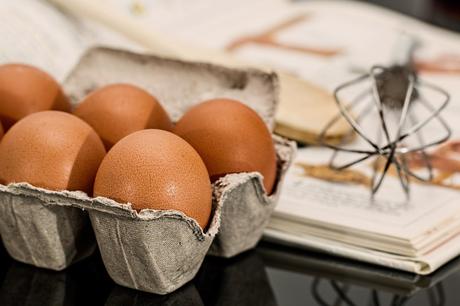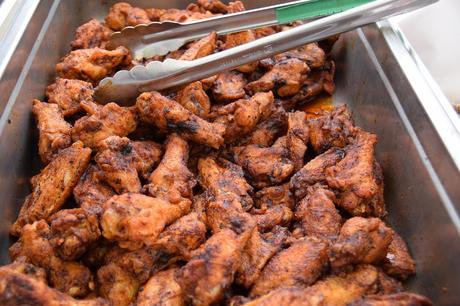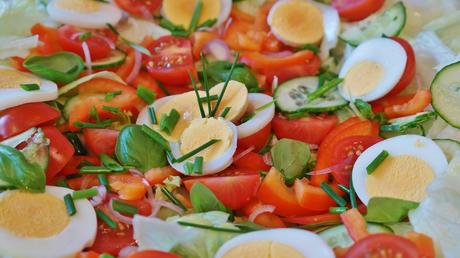
Importance of protein for weight loss
If you're even remotely into health and fitness, you've probably heard that protein is one of the most important nutrients to include in your diet. In fact, it's not just ONE of the most important, it's regarded by many to be the "king of all nutrients."
While it's more commonly pushed as a muscle builder, a lot of people are unaware that protein also plays a pretty big role in weight loss by providing your body several internal benefits, most notably appetite regulation and metabolism acceleration. Let's go over exactly how protein acts as a dietary weapon to fight fat so that you can start using this wonder-nutrient to your advantage.
Protein Helps Regulate Your Appetite

Protein from eggs
When it comes to losing weight, one of the biggest challenges is controlling your appetite. We've all got certain habits when it comes to eating and the whole concept of "burning more calories than you consume" can be difficult to tackle if you've never done it before. That's where protein comes in.
Protein helps keep your appetite in control by altering your hunger hormones. As you know, your brain controls all of the functions in your entire body. This includes hunger. In order to determine when and how much to eat, your brain monitors certain hunger-related hormones that change in response to feeding. Some hormones are used to increase appetite, whereas others are used to reduce it. Protein has an effect on both of these groups.
As your protein intake increases, it reduces the levels of the hormones that increase appetite, while simultaneously increasing the levels of the hormones that reduce appetite. It's like a one-two punch to keep your hunger in check; protein is quite literally working from both sides to ensure your body isn't eating more than it really needs.
RELATED: Research Says: Diets Don't Work And Won't Reduce Fat From Belly
The benefit of this is pretty obvious as a significant reduction in hunger leads to a significant reduction in how many calories you eat throughout the day, considering the two go hand-in-hand. In fact, one study found that people who increased their protein intake to about 30% of their daily calories, consumed an average of 441 less calories per day. That's a massive reduction!
Another direct result of protein altering your hunger hormones is that you experience far less random food cravings. Whether you're a snacker throughout the day or you're guilty of late-night trips to the kitchen, cravings are your worst enemy when it comes to dieting, and often times this alone can ruin all of your hard work eating healthy. Fortunately, several studies have found that a higher protein intake can reduce cravings and snacking desires by as much as 60%, another major win in the appetite department.
Protein Increases Your Metabolism

protein from chicken
Now that you understand how protein helps control your desire for food, let's talk about how it actually speeds up your body's processing of food so that you're not just reducing the number of calories you eat, but also burning more of the calories that you do eat.
At some point in your weight loss journey, you may have heard the term thermogenics. Thermogenic foods are those that require your body to actually burn calories just to digest them. Sounds like a miracle, right? Well, unfortunately we're not talking about burning 500 calories here, the portions are much smaller than that. The key benefit here is that the calorie-burning thermic effect of these foods causes a boost in metabolism, which is much more important to your overall weight loss goal.
Different types of nutrients have different thermic effects, and protein happens to be the highest. Fats only have an effect of about 2-3%, carbs sit around 10-15%, but protein weighs in at a thermic effect of around 30%. This means for every 100 calories you get from protein, only about 70 of those are actually usable as your body burns around 30 calories just to digest and metabolize the protein.
RELATED: How Much Sugar Are You Drinking?
Like I said, 30 calories is nothing major, but the key result here is the jumpstart in your metabolism. Your metabolism is boosted during the processing of protein, and when it's finished processing, it doesn't just return back to it's regular state. Your metabolism stays elevated, and an elevated metabolism means you're burning more calories. Studies have been done to observe this, and results have shown that your body burns an average of 100 extra calories a day just based on eating more protein. If you ask me, that's a pretty serious advantage just for including some more chicken and steak in your diet.
Of course, chicken and steak aren't the only ways to get more protein into your diet, and in order to take full advantage of this nutrient's benefits, that may not even be enough. Next, let's talk about how much protein you really need and the best ways to include it in your diet.
How To Get Enough Protein In Your Diet

How to get enough protein in diet
The beauty of protein is that it can be found in nearly every food group from meat to vegetables to milk. With that being said, the protein you get from a traditional diet is going to be far from optimal if your ultimate goal is losing weight.
The regular dietary recommendation for protein intake is about 50g per day for the average person. While this is enough to keep your body functioning properly, you're going to need to turn things up a notch if you want to use protein as an effective weight loss weapon.
Most studies on the effect of protein on weight loss recommend getting about 30% of your total daily calories from protein if you want to experience the best results. Since everyone's diet plan is different, I'll teach you exactly how to calculate that. Take the total number of calories you eat daily, and multiply that by 0.075. For example, if you're on a standard 2,000-calorie diet, this would equate to 150g of protein (2000 calories multiplied by 0.075 equals 150g).
RELATED: Tip: Eat More Fat Burning Foods… Lose More Belly Fat
Now, that's a ton of protein. To put things into perspective, the average egg contains about 6-8g of protein, and the average chicken breast contains around 25-30g of protein. I'll let you calculate how much of each of those you'd need to eat in order to get 150g of protein in your diet.
While it's not impossible to get all of your protein through food, it would require quite a bit of time, preparation, and money in order to make this a daily habit. This is where protein supplements bring a ton of value to the table. Not only are protein shakes extremely quick and easy to make, but they've got exactly the nutrition you're looking for and at an average of $1-2 per serving they're incredibly cost-effective.
The only real downside to using a protein supplement is that they can taste...interesting. A nice chicken dinner would certainly be the more delicious of the two choices. However, with that being said, there are definitely certain supplement brands that do a good job with flavoring. As long as you read customer reviews ahead of time, you'll be able to figure out if the supplement you're considering has good taste. If you need some guidance here, I just finished a study on Optimum Nutrition protein powder flavors that I think might be useful to those who've never tried a protein supplement before.
Wrapping It Up
When it comes to weight loss, diet is crucial. Experts say that diet is up to four times as important as exercise in order to lose weight, which means you have to be very strategic in what you eat if you want to get the best results.
Protein is an extremely effective aid in weight loss by influencing your body in multiple areas. It alters hormone levels to control your appetite and reduce sporadic food cravings, as well as boosts your metabolism by inducing the natural calorie-burning process of thermogenesis. While it's not impossible to get enough protein from your regular diet, protein supplements are the dietary tool of choice as they provide a much quicker and more cost-effective way to boost your daily protein intake.
Overall, if you want the most effective results in cutting fat and toning your body into tip-top shape, you need to make sure you're eating enough protein. Simple as that.
Author Bio:
Cole is a fitness expert who has over 10 years of experience with weight lifting and nutrition. After going through a radical transformation gaining over 50 pounds of natural lean muscle using nothing but a clean diet and a strict workout regimen, he now enjoys writing about health and fitness on his blog HomeGymr to help others achieve their goals in a natural way too.

